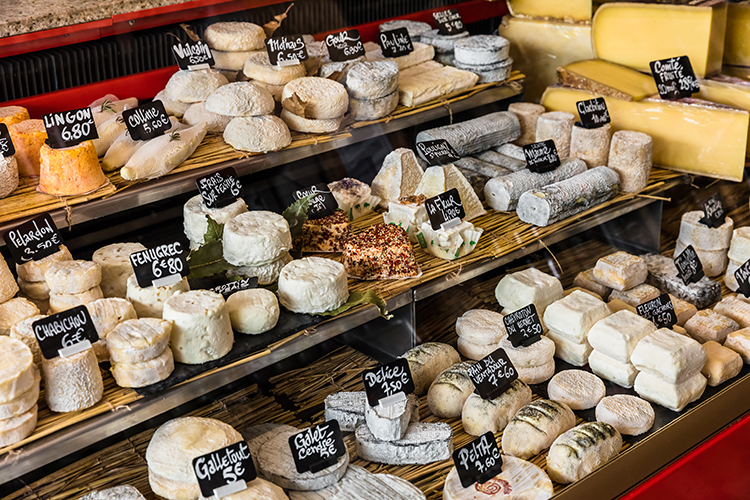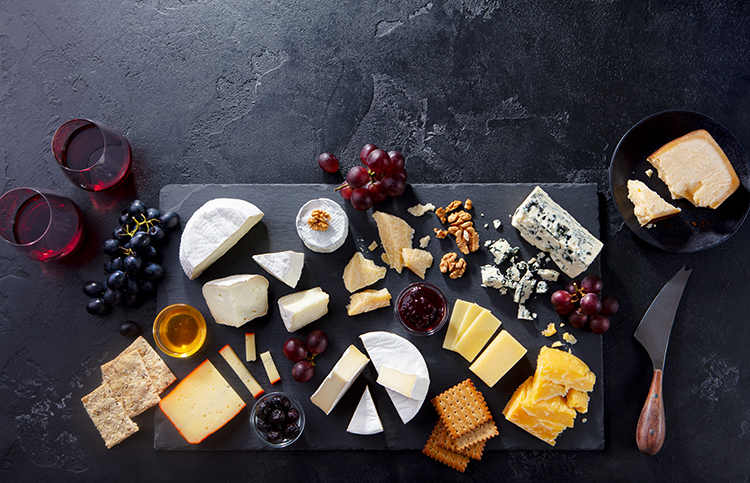
Photo: Stock Photos from PINKYONE/Shutterstock
Pass the cheese plate and pour a glass of red—it’s time to protect our cognitive abilities. Rich cheeses and luxurious wines may not seem healthy at first glance, but a study by researchers from Iowa State University suggests the health impacts of these dietary delicacies are more nuanced. Recently published in the Journal of Alzheimer’s Disease, the study interrogated links between diet and cognitive decline in aging adults. Some of the results proved a pleasing surprise. According to the study, the classic wine and cheese pairing can help prevent cognitive decline—and perhaps even dementia—in people with specific genetic dispositions.
The researchers studied 1,787 mid-to-late-aged adults in the United Kingdom over a period of 10 years. Each subject took a Fluid Intelligence Test (FIT) at the beginning, middle, and end of the research period. The FIT measures cognitive abilities such as memory. Across this time span, the participants also recorded their diets in regular questionnaires—noting the daily intake of fruits, vegetables, dairy, etc. The team then analyzed the significance of diet to changes (or lack thereof) in the subjects’ cognitive abilities. They found that statistically significant results (indicating whether a dietary item was a protective factor or a risk factor) were highly dependent on the category of genetic risk.
For people without a family history of dementia, a daily serving of cheese was found to correlate strongly with higher FIT scores. This indicates that people without a genetic predisposition may benefit cognitively from consuming cheeses—likely due to the calcium, vitamin B12, or “good” bacteria found in the dairy product. If you have a family risk of dementia, red wine may be a more effective dietary choice. The results showed that moderate consumption of wine may improve retention of cognitive abilities in the general population, but particularly so among those genetically vulnerable to decline. These folks must also be careful of salt—which the authors of the study discovered increased likelihood of decline for this group.
One can always have too much of a good thing, though. Too much wine and cheese can cause health problems unrelated to cognitive abilities, so moderation and balance are necessary to reap the rewards discovered by this study. Study author Brandon Klinedinst also recognized the dual roles diet and genetics play in cognitive decline in aging individuals. “Perhaps the silver bullet we’re looking for is upgrading how we eat,” he says. “Knowing what that entails contributes to a better understanding of Alzheimer’s and putting this disease in a reverse trajectory.”
More research—including randomized clinical trials—is necessary to fully determine who benefits from certain food items and how. As many helpful products are expensive, the effects of the diets of the wider population must be studied for the benefit of all. However, it does appear that diet is an important modulator of risk for dementia in aging adults.
A new study of 1,787 aging UK individuals suggests that diet is an important factor—interacting with genetics—in preventing cognitive decline.

Photo: Stock Photos from YULIA GRIGORYEVA/Shutterstock
The subjects took three cognitive tests over a period of 10 years, in which they also recorded their food choices.

Photo: Stock Photos from PREMIER PHOTO/Shutterstock
Red wine (in moderation) was shown to be protective, while cheese was significantly protective for those without a family history of dementia.

Photo: Stock Photos from ANNA_PUSTYNNIKOVA/Shutterstock
h/t: [IFL Science, Better Homes & Gardens]
Related Articles:
30 Creative Wine Gifts for Anyone Who Loves Red, White, or Rosé All Day
World’s Oldest Unopened Bottle of Wine Remains Sealed Since the 4th Century
Artist Creates Daily Toast Designs Inspired by Japanese Traditions
What Did the Romans Eat and Drink? Learn About Dining and Diets in the Ancient Empire
